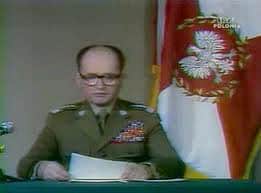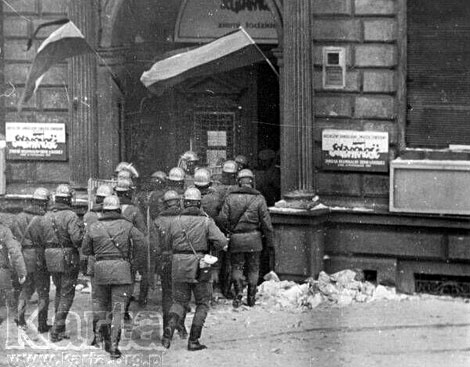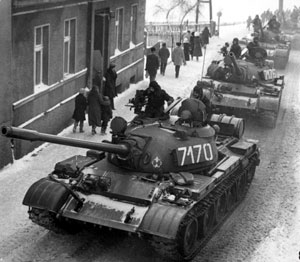
Today marks 29th anniversary of the martial law in Poland. On 13th of December, 1981 Polish general Wojciech Jaruzelski declared martial law in the name of the Military Council of National Salvation. Thousands of people were arrested without charge and as many as 100 were killed.

On a cold and snowy Sunday morning on December 13, 1981 the Poles woke up to find their country under Martial Law (literally – The State of War or „stan wojenny”). The Martial Law was imposed by the Military Council for National Salvation lead by, then, prime minister Gen. Wojciech Jaruzelski and consisting of 20 other high ranking military officers.
The WRON declared Martial Law to „defend socialism”. They felt threatened by the members of the first independent trade union behind the Iron Curtin – the Solidarity (Solidarnosc). The Solidarity had been founded only 18 months earlier, in August of 1980 after several weeks of strikes. The workers had gone on strike to protest poor living conditions and lack of independent representation. With the birth of the Solidarity hopes were high that the new trade union would help to pressure the government to introduce economical reforms and ease restrictions. The government quickly realized that the Solidarity was a threat to the system. Several road blocks were created to derail the Solidarity but the union seemed to grow stronger. The situation made the Soviets very worried and they, on he several occasions, pressured the Polish government and the Polish Communist Party (PZPR) to de-legalized the Solidarity. For the Polish government it soon became apparent that the union was too strong and far too popular to simply de-legalize it. A drastic action was need to oust the Solidarity, so martial law was imposed.
The Constitution stated that martial law could be imposed for defense or national security reasons. The Constitution allowed the State Council (Rada Panstwa) to impose a martial law while the parliament (Sejm) was not in session. Although the parliament was in session, the State Council headed by Henryk Jablonski unconstitutionally passed the law under pressure from the military. Only one member of the Council, Ryszard Reiff, voted against the resolution. The vote took place in the early morning hours of December 13 while Martial Law was under way: people arrested, restriction imposed. The State Council merely rubber stamped the decision of the military that took over the control in the country.

Thousands of Solidarity leadership and activists were arrested and imprisoned without court sentence. Among those arrested was Lech Walesa, the legendary Solidarity leader. The WRON, in an obvious public relations stunt, also arrested some prominent figures from the previous government.
The borders were sealed, airports were closed and road access to main cities was restricted. Travel between cities required permission. Curfew was imposed between 10 pm and 6 am. Telephone lines were disconnected. Mail was subject to censorship. All trade union and other independent organizations were de-legalized. All TV and radio transmissions were suspended (except one government TV channel and one government radio station). Public administration, health services, power generation stations, coal mines, sea ports, train stations, and most of the key factories were placed under military management. The employees had to follow military orders or face a court martial. Classes in schools and at universities were suspended.

The Poles actively resisted the Martial Law by organizing strikes and street marches, but any resistance to the Martial Law was brutally crushed. On December 16, 1981 the police killed 9 striking coal miners at the Wujek Coal Mine in Katowice. The Poles continued to oppose the WRON – many Solidarity members worked underground. They established, the so called, Revolutionary Solidarity and were involved in publishing independent newspapers, organization of street protests, broadcasting radio programs usually cut off by the government jammers). Thousands were arrested and prosecuted.
Martial Law was suspended on December 31, 1982 and terminated on July 22, 1983. Some of the restrictive legislation introduced during the martial law remained in force through the end of the eighties. The failure of the WRON and the ruling Communist Party became clear in 1989 when the Solidarity won by a land-slide in the first free election after World War II.
Source: http://www.videofact.com/english/martial_law.htm
Dziś obchodzimy 29. rocznicę wprowadzenia stanu wojennego.
Co dziś – my współcześni – możemy wynieść z ówczesnych wydarzeń? Czy możemy?
– Obywatelki i obywatele Polskiej Rzeczypospolitej Ludowej! Zwracam się dziś do Was jako żołnierz i jako szef rządu polskiego. Zwracam się do Was w sprawach wagi najwyższej. Ojczyzna nasza znalazła się nad przepaścią. Dorobek wielu pokoleń, wzniesiony z popiołów polski dom ulega ruinie. Struktury państwa przestają działać(…)Ogłaszam, że w dniu dzisiejszym ukonstytuowała się Wojskowa Rada Ocalenia Narodowego. Rada Państwa, w zgodzie z postanowieniami Konstytucji, wprowadziła dziś o północy stan wojenny na obszarze całego kraju.
Tymi słowami 13 grudnia 1981 roku generał Wojciech Jaruzelski rozpoczął swoje wystąpienie telewizyjne proklamujące stan wojenny, który trwał do 22 lipca 1983 roku.
Pomocne linki dotyczące tematu:
http://www.dobroni.pl/rekonstrukcje,29-rocznica-wprowadzenia-stanu-wojennego-warszawa-2010,5976
